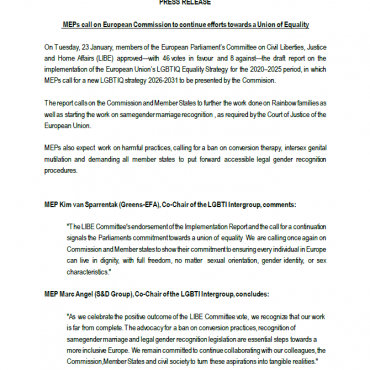New EU accession reports: LGBT rights in the Western Balkans and Turkey
The European Commission’s annual reports on accession countries were published yesterday, and include important and extensive information on the situation of lesbian, gay, bisexual and transgender people in those 8 countries.

Both positive and negative developments are noted. European Commissioner Štefan Füle presented the 2013 progress reports to the European Parliament’s Committee on Foreign Affairs.
More so than previous years, the Commission reported extensively on problems of discrimination and violence against LGBTI people throughout all accession reports.
Positive and negative developments
Positive developments were noted for Serbia and Montenegro, where anti-discrimination strategies were adopted. Furthermore, both in Serbia and Albania laws addressing hate crime were adopted.
The reports show that LGBTI people continue to face discrimination, threats and violence in the Western Balkans and Turkey. This is a consequence of both a lack of anti-discrimination and hate crime legislation, as in Bosnia and Herzegovina, Turkey, Macedonia and Kosovo, and a lack of effective implementation, as is observed in Serbia and Montenegro.
Major occurrences of intolerance against LGBTI people, including threats and attacks, are noted in Macedonia, Montenegro, Serbia, Turkey, Bosnia and Herzegovina and Kosovo.
Serbia is criticized for its problematic ban of Belgrade Pride, showing a lack of sufficient political support for the protection of LGBTI people.
Turkey is singled out for the high rates of hate crime, discriminatory practices in the military, the abuse of the Law on the Internet against LGBTI websites, and for taking out references to discrimination on grounds of sexual orientation or gender identity from a draft law on anti-discrimination.
European Parliament reports
Ulrike Lunacek MEP, Co-President of the Intergroup on LGBT Rights and Rapporteur for Kosovo, commented: “In the face of continuing discrimination against LGBTI people in South-Eastern Europe, it is good to see that the Commission paid more attention to the situation of LGBTI people throughout its accession reports than it has previously done.”
“It shows the EU takes its commitment to human rights seriously.”
Jelko Kacin MEP, Member of the LGBT Intergroup and Rapporteur for Serbia, continued: “I’m happy to see positive developments in Serbia concerning the development of a comprehensive anti-discrimination strategy and improved hate crime law.”
“At the same time, the pride ban cannot be set aside, and neither can the lack of implementation of anti-discrimination legislation. The European Parliament will take this up extensively in our own reports.”
The European Parliament will now adopt its own accession reports over the next few months.
Read more:






